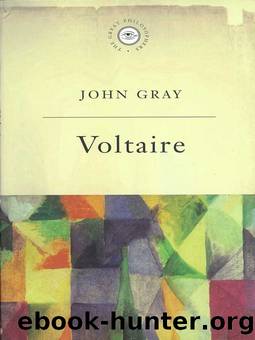The Great Philosophers: Voltaire by John Gray

Author:John Gray
Language: eng
Format: epub
ISBN: 9781780221717
Publisher: Phoenix
VOLTAIRE’S POLITICS
What is toleration? It is the appurtenance of humanity. We are all full of weakness and errors; let us mutually pardon each other our follies, – it is the first law of nature.
Voltaire15
Like all the philosophes, Voltaire worked for the emancipation of the species; but he did not suppose that this meant the universal establishment of a single political regime. Throughout his active life he was committed to the same liberal political values; but he never imagined that these political ideals could, or should, be embodied in one mode of government. At times he opted for enlightened despotism, flirting with Catherine the Great and Frederick of Prussia, at others he supported constitutional monarchy. Here and there in Voltaire’s writings we can even find some favourable references to democracy. (Yet he never shared civic republican beliefs about the inherent virtue of popular self-government.)
Voltaire’s views on what was the best regime changed greatly over his long, busy and varied life. But his life-long political flexibility was not a symptom of inveterate opportunism. It is true that Voltaire enjoyed the company of men and women of power and sought their favour. He was not too scrupulous to flatter those whom he courted. But he did not conceal his views to avoid displeasing them. Voltaire’s support for diverse regimes in different times and places does not show him trimming his opinions to suit his patrons. It was an application of an unchanging outlook. Voltaire was not an opportunist but a political relativist.
The enduring interest of Voltaire’s political thought derives from its fusion of political relativism with liberal morality. Voltaire’s liberalism shows how a pragmatic and instrumental approach to regimes and institutions can be combined with principled commitment to liberal values. It is not only that Voltaire understood that liberal values justified different strategies in varying circumstances. He saw that the histories and environments of different peoples could warrant different regimes indefinitely.
Voltaire admired English institutions inordinately; but he did not think of transposing them to France. He believed that the traditions, the mores, the climates, of different countries made diverse modes of government desirable in them. In this belief, Voltaire was at one with Montesquieu, with whom he differed on many other, less fundamental matters.
Voltaire’s thought does not contain a systematic political theory of the kind we find in Hobbes or Rousseau. But that does not mean his thinking was unsystematic. Much of it is a criticism of grand political theories that neglect the importance of history and circumstance. Voltaire was particularly critical of doctrines that ground the legitimacy of political regimes in the requirements of a state of nature. As a political relativist, he was hostile to all such arguments. Indeed, in its more theoretical aspects, Voltaire’s political thought is a sustained criticism of the uses of the state of nature in political thought, especially in that of his famous contemporary, J.-J. Rousseau.
Few writers have ever displayed more withering contempt for Rousseau than Voltaire. He thanked Rousseau for sending him his ‘new book
Download
This site does not store any files on its server. We only index and link to content provided by other sites. Please contact the content providers to delete copyright contents if any and email us, we'll remove relevant links or contents immediately.
The remains of the day by Kazuo Ishiguro(8961)
Tools of Titans by Timothy Ferriss(8359)
Giovanni's Room by James Baldwin(7313)
The Black Swan by Nassim Nicholas Taleb(7097)
Inner Engineering: A Yogi's Guide to Joy by Sadhguru(6782)
The Way of Zen by Alan W. Watts(6589)
Asking the Right Questions: A Guide to Critical Thinking by M. Neil Browne & Stuart M. Keeley(5751)
The Power of Now: A Guide to Spiritual Enlightenment by Eckhart Tolle(5741)
The Six Wives Of Henry VIII (WOMEN IN HISTORY) by Fraser Antonia(5493)
Astrophysics for People in a Hurry by Neil DeGrasse Tyson(5172)
Housekeeping by Marilynne Robinson(4433)
12 Rules for Life by Jordan B. Peterson(4298)
Double Down (Diary of a Wimpy Kid Book 11) by Jeff Kinney(4257)
The Ethical Slut by Janet W. Hardy(4235)
Skin in the Game by Nassim Nicholas Taleb(4232)
Ikigai by Héctor García & Francesc Miralles(4229)
The Art of Happiness by The Dalai Lama(4118)
Skin in the Game: Hidden Asymmetries in Daily Life by Nassim Nicholas Taleb(3986)
Walking by Henry David Thoreau(3948)
